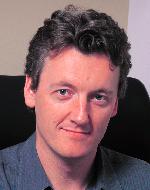Thieme-IUPAC Prize in Synthetic Organic Chemistry for
2006
Announced
Thieme Publishers and IUPAC in collaboration with the editors of
SYNTHESIS, SYNLETT, Science of Synthesis, and Houben –Weyl announce
the recipient of the
2006 Thieme-IUPAC Prize in Synthetic Organic Chemistry
David W.C. MacMillan
 We
are pleased to announce that the 2006 Thieme IUPAC Prize awardee is
David W.C. MacMillan of the California Institute of Technology.
The Prize, consisting of 5000 Euros, is awarded every two years on the
occasion of the IUPAC International Conference on Organic Synthesis
(ICOS) to a scientist under 40 years of age whose research has had a
major impact on the field of synthetic organic chemistry. The Prize
will be presented to David MacMillan at his Award Lecture on June 13,
2006, at the ICOS-16
Conference in Meida, Mexico.
We
are pleased to announce that the 2006 Thieme IUPAC Prize awardee is
David W.C. MacMillan of the California Institute of Technology.
The Prize, consisting of 5000 Euros, is awarded every two years on the
occasion of the IUPAC International Conference on Organic Synthesis
(ICOS) to a scientist under 40 years of age whose research has had a
major impact on the field of synthetic organic chemistry. The Prize
will be presented to David MacMillan at his Award Lecture on June 13,
2006, at the ICOS-16
Conference in Meida, Mexico.
David MacMillan was born in 1968 in Bellshill, Scotland. He obtained
his under-graduate degree from Glasgow University, and in 1990 moved
to the University of California, Irvine, where he obtained his Ph.D.
under the direction of Larry E. Overman. Following postdoctoral research
with David A. Evans at Harvard University, David began his independent
research career at the University of California, Berkeley, in 1998.
In 2000,he joined the department of chemistry at Caltech, and was promoted
to full professor in 2003. Through his research contributions, David
MacMillan has become a leader in the currently active area of asymmetric
organo-catalysis. His numerous accomplishments include the design of
a series of chiral amines, available from amino acids, to catalyze the
enantioselective cycloaddition reactions of dienes or 1,3-dipoles and
a, b-unsaturated aldehydes by reversible iminium ion formation.
The approach has been admirably applied to the catalytic asymmetric
Friedel-Crafts alkylations of pyrroles, indoles, anilines, and furans,
which proceed in excellent yields and with high enantiomeric excess.
These are the first examples of this reaction in catalysis; no organometallic
catalyst has been devised for these transformations.
In addition, using chiral amine catalysts, David has achieved the first
enantioselective cross-aldol condensation of aldehydes, a reaction type
which eluded chemists for some time, and could previously only be carried
out with the aid of enzymes. This landmark achievement has been improved
and extended, and applied to the rapid assembly of natural and nonnatural
carbohydrates with enantioselectivities approaching 100 %.
Recently, David and his group devised the first enantioselective transfer
hydrogenation reaction for alkenes using organocatalysts. He has also
introduced a new concept for asymmetric catalysis termed "enantioselective
organo-cascade catalysis". This conceptually new strategy relies
on David's finding that imidazolidinone catalysts can function as both
iminium and enamine activation catalysts (orthogonal activation). By
merging these catalytic cycles, it was demonstrated that the biochemical
concept of enzymatic catalysis cascades can be emulated in the laboratory
using small-molecule catalysts.
David W.C. MacMillan 's work has found widespread industrial application,
and his generalization, systematic exploration, and brilliant conceptualization
has made a major impact in launching enantioselective organo-catalysis
as a rapidly growing field of research for organic chemists. His success
is reflected in the numerous awards he has received from the Royal Society
of Chemistry, the American Chemical Society,Tetrahedron, Bristol-Myers
Squibb, Pfizer, GlaxoSmith-Kline, Eli Lilly, and Boehringer Ingelheim,
among other organizations.
We congratulate David MacMillan and look forward to hearing the latest
exciting developments from his laboratories, an Account of which
will be published in SYNLETT, at his Award Lecture in Merida, Mexico.
> MacMillan's
Homepage
> Back to Thieme-IUPAC
Prize page
<prize announcement published in
Chem. Int. May 2006>

